

Why Historians Need Imagination. Yoav Tenembaum is a lecturer in the Diplomacy Studies Program at Tel Aviv University.

He obtained his doctorate degree in Modern History from Oxford University and his master’s degree in International Relations from Cambridge University. He did his BA in History at Tel Aviv University. Science and the imagination in the age of reason .pdf. Future - Why science needs imagination and beauty. Albert Einstein famously said: “Imagination is more important than knowledge.”
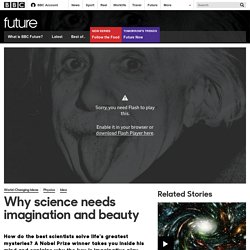
They’re both important, says physicist and Nobel Prize recipient Frank Wilczek, but knowledge without imagination is barren. Take his subject of theoretical physics. As Wilczek says a lot of what you do is to try to understand Mother Nature’s mind and her sense of beauty to see how the laws of physics could be more beautiful. Not many people truly appreciate what happened in physics in the last part of the 20th Century.
We understood at a level whose profundity would be difficult to exaggerate what matter is. On the Importance of Imagination in Historical Studies. In the 1940’s British philosopher R.G.
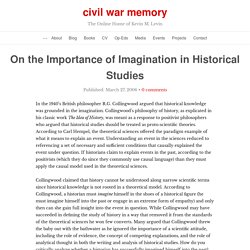
Collingwood argued that historical knowledge was grounded in the imagination. Collingwood’s philosophy of history, as explicated in his classic work The Idea of History, was meant as a response to positivist philosophers who argued that historical studies should be treated as proto-scientific theories. According to Carl Hempel, the theoretical sciences offered the paradigm example of what it means to explain an event. Understanding an event in the sciences reduced to referencing a set of necessary and sufficient conditions that causally explained the event under question. If historians claim to explain events in the past, according to the positivists (which they do since they commonly use causal language) than they must apply the causal model used in the theoretical sciences. Collingwood claimed that history cannot be understood along narrow scientific terms since historical knowledge is not rooted in a theoretical model.
Imagination in mathematics. Chapter 34 Imagination in mathematics.
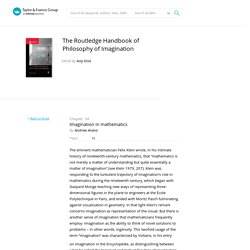
The Economic Imagination - Stanford University Press Blog. The magical thinking of economists is a pathology of thought with deep historical roots. by MIKE HILL & WARREN MONTAG God's hand from "The Creation of Adam," Michelangelo's world famous fresco in the Sistine Chapel.
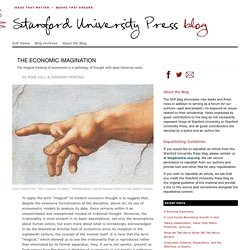
To apply the term “magical” to modern economic thought is to suggest that, despite the extensive formalization of the discipline, above all, its use of econometric models to analyze its data, there remains within it an unassimilated and unexamined residue of irrational thought. Scientific modeling. Scientific modeling, the generation of a physical, conceptual, or mathematical representation of a real phenomenon that is difficult to observe directly.
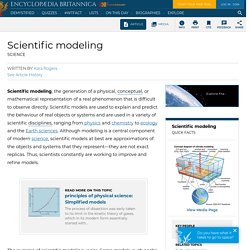
Scientific models are used to explain and predict the behaviour of real objects or systems and are used in a variety of scientific disciplines, ranging from physics and chemistry to ecology and the Earth sciences. Although modeling is a central component of modern science, scientific models at best are approximations of the objects and systems that they represent—they are not exact replicas. Thus, scientists constantly are working to improve and refine models. The Beginning of Infinity. A good explanation in science. Biblical literalism.
A term used differently by different authors concerning biblical interpretation.

Caravaggio. 16th and 17th-century Italian painter Michelangelo Merisi (Michele Angelo Merigi or Amerighi) da Caravaggio (/ˌkærəˈvædʒioʊ/, US: /-ˈvɑːdʒ(i)oʊ/, Italian pronunciation: [mikeˈlandʒelo meˈriːzi da (k)karaˈvaddʒo]; 28 September 1571[2] – 18 July 1610) was an Italian painter active in Rome, Naples, Malta, and Sicily from the early 1590s to 1610.
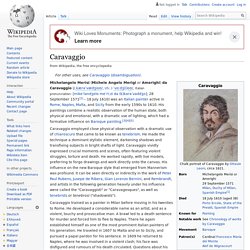
His paintings combine a realistic observation of the human state, both physical and emotional, with a dramatic use of lighting, which had a formative influence on Baroque painting.[3][4][5] Caravaggio employed close physical observation with a dramatic use of chiaroscuro that came to be known as tenebrism. Nikola Tesla and Thomas Edison: The war of currents and the search for truth - Education Today News. Nikola Tesla and Thomas Edison are two giants of electrical engineering whose inventions changed history.

The Lost Knowledge of the Ancients: Were Humans the First? Part 1. Much of modern science was known in ancient times.
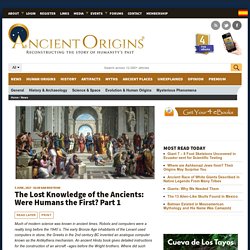
Robots and computers were a reality long before the 1940´s. The early Bronze Age inhabitants of the Levant used computers in stone, the Greeks in the 2nd century BC invented an analogue computer known as the Antikythera mechanism. Hypatia. Hypatia (/haɪˈpeɪʃə/ hy-PAY-shə; Ancient Greek: Ὑπατία; Hypatía) (born c. AD 350 – 370; died 415[2]) was a Greek Alexandrine Neoplatonist philosopher in Egypt who was one of the earliest mothers of mathematics.[3] As head of the Platonist school at Alexandria, she also taught philosophy and astronomy.[4][5][6][7]
Mikhail Bakhtin. Mikhail Mikhailovich Bakhtin (/bɑːkˈtiːn, bɑːx-/;[2] Russian: Михаи́л Миха́йлович Бахти́н, pronounced [mʲɪxɐˈil mʲɪˈxajləvʲɪtɕ bɐxˈtʲin]; 16 November [O.S. 4 November] 1895 – 7 March[3] 1975) was a Russian philosopher, literary critic, semiotician[4] and scholar who worked on literary theory, ethics, and the philosophy of language. His writings, on a variety of subjects, inspired scholars working in a number of different traditions (Marxism, semiotics, structuralism, religious criticism) and in disciplines as diverse as literary criticism, history, philosophy, sociology, anthropology and psychology. Although Bakhtin was active in the debates on aesthetics and literature that took place in the Soviet Union in the 1920s, his distinctive position did not become well known until he was rediscovered by Russian scholars in the 1960s. Early life[edit] Analogy in Literature: Definition & Examples - Video & Lesson Transcript.
Scientific modeling. Analogy and Analogical Reasoning. 1. Introduction: the many roles of analogy Analogies are widely recognized as playing an important heuristic role, as aids to discovery. They have been employed, in a wide variety of settings and with considerable success, to generate insight and to formulate possible solutions to problems. According to Joseph Priestley, a pioneer in chemistry and electricity, analogy is our best guide in all philosophical investigations; and all discoveries, which were not made by mere accident, have been made by the help of it. (1769/1966: 14) Priestley may be over-stating the case, but there is no doubt that analogies have suggested fruitful lines of inquiry in many fields.
Analogies have a related (and not entirely separable) justificatory role. At the other extreme, an analogical argument may provide very weak support for its conclusion, establishing no more than minimal plausibility. Such modesty is not uncommon. Historical analogies in the media. Theories of Mathematics Education Is Plurality a P. Too much theory leads economists to bad predictions. Whether it was the physicist Niels Bohr or the baseball player Yogi Berra who said it – or, most likely, someone else – it is indeed hard to make predictions, especially about the future. This is certainly so regarding economic, social and political phenomena. If you don’t believe me, just ask the Nobel prizewinning economist Paul Krugman, who, writing in The New York Times on the night of Donald Trump’s election victory in November 2016, predicted an imminent global recession, from which global markets might ‘never’ recover.
We’re still waiting. Ideology and Theories of History Murray N Rothbard 2. The Importance of Taking the Perspective of Others. Source: lovelyday12/Shutterstock In order to resolve conflict constructively, so that all parties are satisfied with the outcome, a person must be able to hold all the opposing ideas, positions, and perspectives in mind at the same time and still function effectively.
Successful problem solving and conflict resolution largely depends on a person’s ability to take the opponent’s cognitive and affective perspectives and understand how the conflict appears to the other person and how that person is reacting emotionally and attitudinally. If a person cannot take the perspective of opponents, then his or her understanding of the issue is limited and incomplete. article continues after advertisement When people disagree, there needs to be a realistic assessment of common and opposed interests and conclusions.
There are five important aspects of perspective taking.